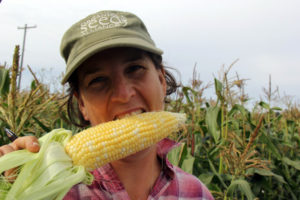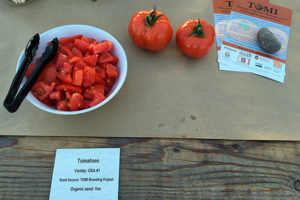
People are connecting to their food in meaningful ways every day. You can greet your local farmer at the market, view bucolic fields behind a roadside farm-stand, or look for organic food labels at the store. Yet one part of your food’s story is especially difficult to see.
The fundamental building block of our relationship to food is seed. Farmers have long managed seed as a resource, saving the seeds of the best food plants they produced and encouraging the improvement of the vegetable variety when planted again the next year. Like animal breeders, farmers would cross and combine related plant varieties, making new ones and expanding the diversity of our food. The genetic resource that is our food was stewarded and enlarged by the people who fed us.
That shared agricultural heritage was largely supplanted by the industrialization of agriculture in the last century, during which biodiversity was lost in the name of uniformity. More recently, it was further restricted by genetic engineering and court decisions that allow the patenting of seeds. Instead of farmers stewarding seed, today multinational agrochemical companies own nearly 67 percent of the world’s seed supply. From 2008 to 2013 alone, the top agrochemical conglomerates bought up 70 smaller seed companies, discontinuing the sales of some varieties that can be saved for seed in favor of patented or hybrid varieties that bring in more profits.

What does that mean to you, the eater? It means that most of the seed sold for food production enriches corporate giants like Monsanto and Dow Chemical. Even consumers of food labeled non-GMO may inadvertently be sending consumer dollars to the genetic engineering industry if they do not know their food’s seed origins.
Farmers using ecological methods want seed that works well in those systems, and that seed is in short supply in a market dominated by agrochemical companies. Although certified organic growers are required to use organic seed when it is commercially available, most organic farmers rely on conventional seed, and on large scale organic operations, very little organic seed is used.
At Organic Seed Alliance, we are working to increase access to organic and savable seeds, and to empower more farmers to grow seed as part of a diversified farm business. But we can’t do it alone.
What you can do:
- Support funding of organic research. Encourage your congressional representatives to increase funding of organic research in the 2018 Farm Bill. Read more here.
- Choose organically grown food. Your consumer dollars can go a long way to encourage more resources for sustainable food.
- Support your local farm. Ask how the farm sources its seed, and encourage them to use organic seed and to grow some of their own.
- Grow your own food and save seeds. It’s easier than you think, incredibly empowering and gives you something to share at local seed swaps and libraries. Download a copy of A Seed Saving Guide for Gardeners and Farmers.
- Stay informed. Keep up with the latest seed news by signing up for the OSA newsletter.
